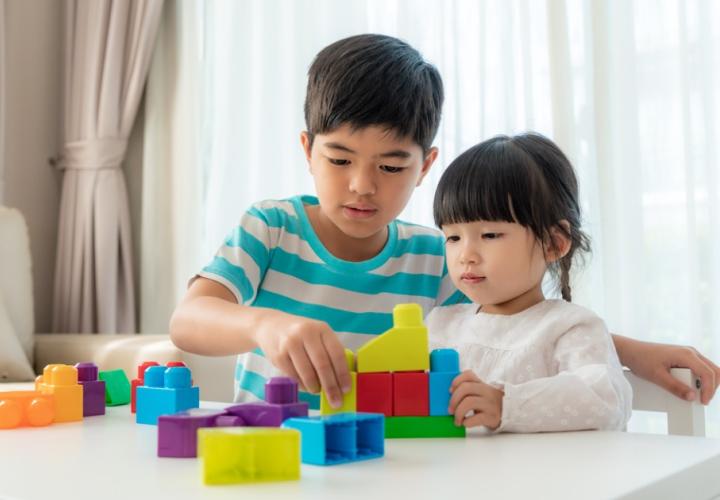When a child learns their sibling has cancer, they may have many questions, or want to know how to help. Connecticut Children's Child Life Specialist, Kelly Muccino, tackles challenges you might encounter, and ways to solve them, if you are ever in this position.
Kids with siblings who have cancer may:
- Struggle with a wide range of emotions including fear and sadness.
- Be ashamed of feeling jealousy, guilt or resentment.
- Feel the need to perform perfectly in school or behave perfectly at home to prevent additional burdens on their families.
- Feel forgotten when their family is dealing with their sibling’s cancer diagnosis.
>Related: How to Check On Your Child's Mental Health
“What’s going on?”
Explaining to the child what’s happening with their brother or sister may help them feel like a valued member of the family. Refer back to this blog for ways to describe specific terms like chemotherapy and tumors.
For younger siblings, emphasize that they did not cause their brother or sister to get cancer. Talking openly about cancer will help ensure that it’s no one’s fault.
Help siblings acclimate to the hospital environment by bringing them for visits. If they cannot or prefer not to come to the hospital, engage them in an activity that allows them to virtually enter the hospital space, such as video chatting. For younger children, you might try taking a photo of the hospital room and hiding a favorite toy in a different position each day. This type of “find it” or “eye spy” activity can help siblings feel included and may desensitize them to the hospital environment so they feel more comfortable when they visit.
“Who will take care of me?”
A cancer diagnosis comes with a change in routine and a “new normal” for everyone in the family. Siblings like to know what their brother’s or sister’s treatment means for them. Who will make them dinner, help them with their math homework, or tuck them in at night? Will they still be able to visit with their friends? Keep siblings in the loop when plans need to change.
Help siblings identify the people they would like to tell. Explain that it’s helpful to share what’s going on with a few key people such as their close friends, schoolteachers, or sports coaches. Role play how to respond to questions when they don’t feel like talking about their sibling’s cancer.
Schedule quality time when the sibling will receive your undivided attention. Write activity ideas on popsicle sticks and put them in a jar – have your child choose an activity from the jar for a “sibling date”. Ask family members and friends to also write activity ideas down on popsicle sticks and to provide you with the materials to do the craft/activity with your child.
>Related: Does Your Child Have Anxiety? Try a Coping Toolbox.
Try using calendars and other visual devices to explain their sibling’s cancer treatment routine
Large, shared calendars can help children know what to expect. Include things like: who’s going to be home with the sibling that night, when the child will be staying overnight in the hospital, fun family days, etc. Make sure these calendars are flexible (use magnets or dry erase markers) and verbalize to children that although you’ll do your best to stick to this schedule, sometimes things need to change. This lays the groundwork for adaptability and sets expectations from the beginning.
“How can I help?”
Give children a role in helping their brother or sister. Have them make paintings to hang in their sibling’s hospital room or have them pack a bag of fun things for their siblings to play with while they’re in the hospital. This may help them feel like an important part of the family and may give them a sense of control.
Lastly, try to keep things as “routine” as possible. Children are resilient, but they also thrive on routine.
Sibling support groups at Connecticut Children’s
Connecticut Children’s offers workshops called “Sibshops” one Friday a month from 4:30 to 7:30 pm. These workshops are targeted to siblings of patients with chronic healthcare needs. Sibshops is a free program especially designed for brothers and sisters of kids with special health and developmental needs. We invite all siblings to join us for peer support, education, medical play and other fun activities led by a certified Child Life Specialist.
Family style meal provided!
RSVP:
Pre-registration is required: call 860.545.8116 or email pmclarney01 [at] connecticutchildrens.org (pmclarney01[at]connecticutchildrens[dot]org)
Location:
Raytheon Technologies Family Resource Center,
282 Washington St. Floor 2 in Hartford, CT
All current CDC recommendations /hospital safety guidelines will be reinforced.
